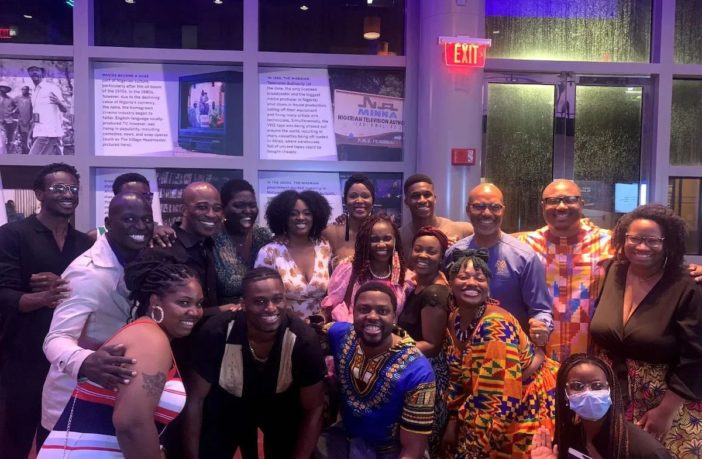Due to the relative ease of tracing ancestry online, a large number of African Americans are finding that their genealogy traces back to Nigeria. This knowledge of ancestry has caused a surge in interest in Nigerian languages, food and culture nationally, internationally and in the Washington, D.C., region.
The first of its kind to open in the nation, the Nigerian Center focuses on assisting all minority populations to embrace, study and understand Nigerian culture. The center teaches native Nigerian languages: Hausa, Yoruba and Igbo. Thought to be a way to teach second- and third-generation immigrant families their native languages, these classes have been attended by diverse groups, predominantly African Americans.
“Over the years, interest in learning Igbo has evolved from second- and third-generation families to people who have married Igbo, those wanting to learn a new language, travelers, those interested in culture, and professionals who have a connection to Nigeria,” said Toochi Ngwangwa, president of Express Igbo, which partners with the Nigerian Center.
Ngwangwa, a lawyer by trade, explained that “being a person of color,” offers “Nexus points of connection all over the world.”
“Being multilingual gives us cultural credibility when we travel to these parts of the world and disrupts stereotypes about [people of color],” Ngwangwa continued. “It also opens opportunities and relationship pathways that may not avail themselves to people who are monolingual.”
Many mainstream celebrities prove Ngwangwa’s sentiments. Bishop T.D. Jakes, through DNA testing, has proudly confirmed his Nigerian roots.
Jakes described tracing his ancestry as “regaining a part of myself that was lost”.
Other famous personalities such as Porsha Williams, Forest Whitaker, Danny Glover, Judge Glenda Hatchett, and Jim Brown, have also embraced their Nigerian heritage.
A second-generation Nigerian American, Morenike Adaku, 26, serves as cultural chair of Nigerian Center partner Umu Igbo Unite.
“Learning Igbo has brought greater connection to my personal and professional culture,” Adaku said. “There were so many things that my parents would say in English that went over my head. Hearing and understanding those same phrases in Igbo gave me greater understanding. One of my greatest joys now is traveling home being able to speak to the elders and take in the vast cultural history and heritage that they have lived.”
Jordan A. Bryant, 33, is a community advocate and student of Yoruba at the Nigerian Center. Fluent in English and Russian and proficient in Spanish, Bryant emphasized the need for people of color to embrace learning African languages.
“It is one of many defects of American education that we are taught European languages but not languages relating to Black history or culture. One of the most important erasures of color is language. Languages help to connect to your culture and roots,” said Bryant. “Without access to language and culture, African Americans, in great degree, have become a rootless people.”
Gbenga Ogunjimi, 41, founder and executive director of the Nigerian Center, said language is key in molding cultural identity.
“Language is a form of identity imperative to forging cultural identity and belonging. For those of us in the diaspora, it is critical to assimilation, and part of our way of restoring culture,” Ogunjimi said. “Whether you’ve been here for centuries or are newly immigrated, it reconnects you to that culture.”
Ogunjimi indicated that language plays a major role in fulfilling the Nigerian Center’s core mission to connect the world to Nigerian culture through programs surrounding financial inclusion and social justice opportunities.
“Being fluent in another language, especially one dealing with heritage and ancestry, is one of the key ways of establishing cultural and professional identity for oneself. In the DMV region which is highly multicultural, fostering cross-cultural competency presents opportunities for people of all economic backgrounds. Whether from Ward 8 or Montgomery County, in D.C., your career competition is global.”
Bryant, who holds a J.D. from Yale and a bachelor’s from Harvard, echoed Ogunjimi’s sentiments.
“It is important for people of color to be citizens of the world. In other countries, it is a birthright that children speak multiple languages. For our own edification and intellectual expansion, learning another language is extremely rewarding. Being Black and being proficient in a language that is unexpected not only helps you to engage culturally but to stand out on a resume,” said Bryant, whose undergraduate degree is in Slavic Language, Literatures and the Classics.
Washington, D.C., houses one of the largest Nigerian populations in the nation. The only center of its kind in the U.S., the work of the Nigerian Center has not gone unnoticed. Mayor Muriel Bowser, hailing the contributions of Nigerian-American civic leaders, innovators, and entrepreneurs, proclaimed Oct. 1, 2022, as Nigerian American Day.
Ogunjimi noted that the Nigerian Center is of benefit to all people, even himself.
“As a native Nigerian married to an African American, my wife and I too are learning how to ensure that our 2-year-old son embraces all sides of his culture,” Ogunjimi told The Informer.
“For all people of color it is the sense of community and the commonality of embracing culture that people resonate to. Being in a community with abundant cultural resources like the Nigerian Center is a transformative experience, even for me.”



